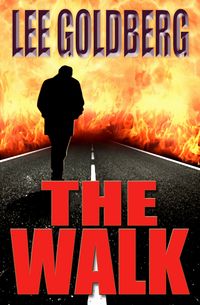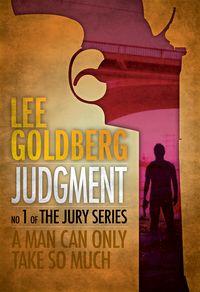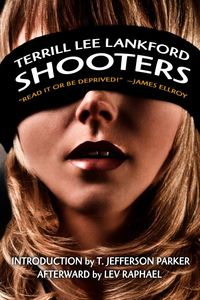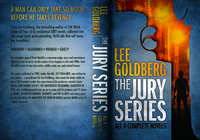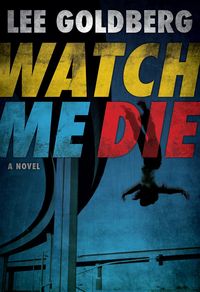 I’ve written thirty novels – eight of them Diagnosis Murder books and thirteen of them Monk tales – but my favorite out of them all is Watch Me Die, which was originally published in hardcover in 2005 under the title The Man with the Iron On Badge.
I’ve written thirty novels – eight of them Diagnosis Murder books and thirteen of them Monk tales – but my favorite out of them all is Watch Me Die, which was originally published in hardcover in 2005 under the title The Man with the Iron On Badge.
It’s about a guy who learns everything he knows about being a PI from reading books and watching TV shows. It's about the clash between fictional expectations/stereotypes and reality. The book is something of a spoof…and yet, at the same time, a straight-ahead crime novel full of explicit sex and violence. That shifting tone made the book a hard sell…because it didn't fit into a particular marketing niche. Is it a satire? Is it a PI novel? Is it a thriller?
Most of the editors who rejected the book back in 2003 praised the writing but didn't see where it would fit in their publishing line. There were two editors at major houses who loved it and wanted to acquire it…but couldn't convince their superiors. Another wrote a LONG rejection letter, saying how much she loved it, that it was the best PI novel she'd ever read, and how it pained her not to be able to publish it. (In the mean time, I wrote a screenplay version of the book, which landed me the gig writing the Dame Edna movie. It never got made, but it was a very, very big payday for me and was my first solo screenwriting job outside of episodes of TV shows that I'd produced).
It was frustrating not being able to sell the book because I felt it was the best novel I'd ever written. I loved writing it and I very much wanted to write more about Harvey Mapes, the main character. I couldn’t complain too much, because I was having a lot of success with other books. Even so, this one meant more to me than the others. I approached my Diagnosis Murder & Monk editors at Penguin/Putnams about The Man with the Iron-On Badge…but as much as they liked me, and my work, they weren't willing to take the gamble.
Finally, after two years of shopping the book, we took it to Thomson/Gale/Five, which had a reputation for putting out fine mysteries…and for being a place where published authors can find a home for their "dropped" series and unpublished works. It was an imprint run by writers (like founder Ed Gorman) and editors (like legendary book packager Martin Greenberg) who truly loved books and appreciated authors. They produced handsome hard-covers that were respected and reviewed by the major industry publications. I had a great experience with them on The Walk (another book that was a hard sell that but went on, after it fell out of print, to sell 20,000 ebook copies in two years) and I knew they would treat the book well. 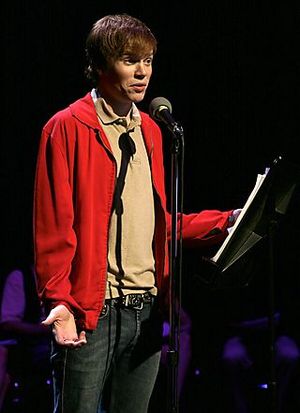
The downside with Five Star was that they paid a pitifully low advance, primarily served the library market and had very limited distribution to bookstores. Still, it was possible to win wide acclaim and impressive sales with a Five Star title. And I did. Here's a sample of the reivews:
"As dark and twisted as anything Hammett or Chandler ever dreamed up […] leaving Travis McGee in the dust." Kirkus, Starred Review
“This was a witty, wonderful book,” Deadly Pleasures
“Goldberg delivers a clever riff on the traditional private eye novel, resplendent with witty and dark turns,” Knight-Ridder Newspapers.
“A fast paced, first person thriller about an under achiever who has to strive to be more than he ever thought he could be,” Permission to Kill
“Approaching the level of Lawrence Block is no mean feat, but Goldberg succeeds with this engaging PI novel,” Publishers Weekly
"Lee Goldberg bravely marches into territory already staked out by some fierce competition — Donald Westlake, Lawrence Block, the early Harlan Coben– and comes out virtually unscathed." The Chicago Tribune
"Goldberg has a knack for combining just the right amount of humor and realism with his obvious love for the PI genre and his own smart ass sensibilities. [The book] is a terrific read. Goldberg is the real deal and should be on everyone’s must read list." Crimespree Magazine
The book even got nominated for the Shamus Award for best novel by the Private Eye Writers of America (losing to Michael Connelly’s The Lincoln Lawyer)
And although it sold well for Five Star, it failed to land a paperback or foreign rights sales…and went out of print in 2007.
Last year, I re-released it as an ebook…where it has failed to gain much traction, despite several different covers, lots of flogging on this blog, and a stage production by the legendary Firesign Theatre.
So now I have re-re-released it as Watch Me Die. And am doing more flogging.
I really, really want Watch Me Die to succeed.
I want it to be my bestselling book…by far. Not so much for the money, but because I am proud of it.
And if it does finally do well, I can justify to myself (and, more importantly, to my wife), investing the time to write the sequel. Or a string of sequels. I would like nothing better than to write as many Harvey Mapes books as I have Monks…or many more….because Harvey Mapes is a character and a voice and an attitude that I love.
So please, help me do that. Spread the word about Watch Me Die.
(Pictured: Orson Ossman performing as "Harvey Mapes" in the Firesign Theatre radio play/stage production, at the RiverPark Performing Arts Center in Owensboro, Kentucky )




